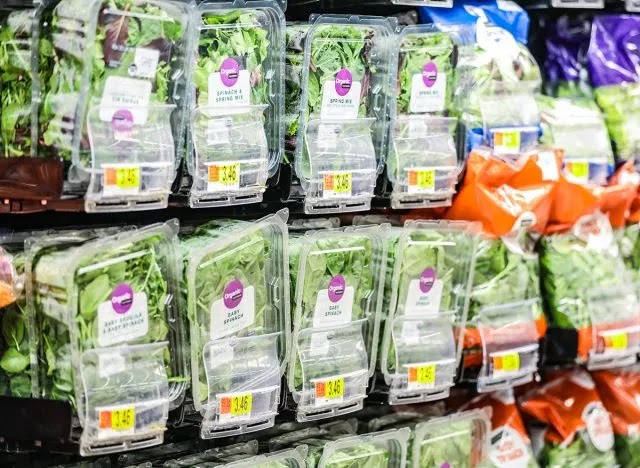Rinsing this one food item may do
more harm than good.
When preparing dinner from scratch with fresh ingredients, there
is generally a fair amount of peeling, chopping, slicing, and rinsing to be
done, especially when vegetables are involved. However, you should think
carefully before bringing any produce ingredients to the sink. This is because
some vegetables should never be washed before eating, according to experts.
After taking this from the fridge, read on to find out what you shouldn't
rinse.
Never wash pre-washed lettuce or greens before eating them.
Even though your vegetables appear to be clean, it's commonly
known that they need a quick rinse before being chopped and added to your dish.
Experts suggest that any leafy greens that come prepackaged in a container that
reads "triple washed" shouldn't get a pre-prep wash, no matter how
clean your kitchen is.
Neva Cochran, RDN, a dietitian, nutrition communications
consultant, and an advisory panel member to the Leafy Greens Marketing
Agreement, explained that rewashing leafy greens at home might increase the
danger of leafy greens picking up bacteria from your sink, counters, cutting
boards, knives, colanders, salad spinners, bowls, or other items or surfaces in
your kitchen that the greens may come into touch with during the washing
process.
As you wash pre-washed greens in your kitchen, you're likely to
contaminate them.
Nobody wants to eat contaminated food that was made in a messy
kitchen. But when it comes down to it, even the most immaculately maintained
home cooking spaces are nowhere near the cleanliness standards of the sites
where your prepackaged greens are processed. Cochran says that "leafy
greens in sealed bags labelled 'triple washed,' 'washed,' or 'ready-to-eat' are
produced at a facility inspected by a government regulatory authority and run
under Good Manufacturing Practices."
Other experts point out that modern processes and techniques have
made it easier to ship ready-to-eat leafy produce safe to eat. "Pre-washed
greens are treated with a mix of water and a food-grade sanitizing agent, like
hydrogen peroxide or chlorine," Randy Worobo, PhD, associate professor of
food science at Cornell University, told Real Simple. According to the
Environmental Protection Agency (EPA), the mixture "reduces and stops the
spread of bacteria from the produce surface," according to the
Environmental Protection Agency (EPA), and poses no risk at such low levels.
Just because you're not rinsing pre-washed greens doesn't mean you
shouldn't be taking any precautions.
Even if your lettuce, spring mix, or arugula is ready to use right
out of the package, there are a few tried-and-true rules to follow when using
it. Before handling the produce, wash your hands for 20 seconds with soap and
hot water, as you should while preparing food. Before moving your greens onto
any surfaces, such as cutting boards or mixing bowls, ensure they've been
cleaned or sanitized. And remember that your kitchen sink itself can sometimes
be the place most likely to contaminate your ingredients, so be sure to clean
it thoroughly before you start to cook.
The CDC says you should never wash meat or poultry before cooking
it.
You shouldn't wash anything during meal prep, not just pre-washed
leafy greens. Rinsing meat, poultry, or eggs is likewise a bad idea, according
to the Centers for Disease Control and Prevention (CDC). The CDC advises that
"washing raw meat, chicken, turkey, or eggs might transmit germs to your
sink, countertops, and other kitchen surfaces." "Those germs can
spread to other foods, such as salads or fruit, making you sick."
Because of modern commercial washing techniques, the United States Department of Agriculture (USDA) claims that washing meat or poultry is no longer necessary. While washing to remove dirt, slime, fat, or blood may have been appropriate decades ago when many people slaughtered and prepared their food; the USDA believes it is no longer necessary. Meat and poultry are sufficiently cleaned during processing, according to the agency. As a result, any further washing is an unnecessary risk.





